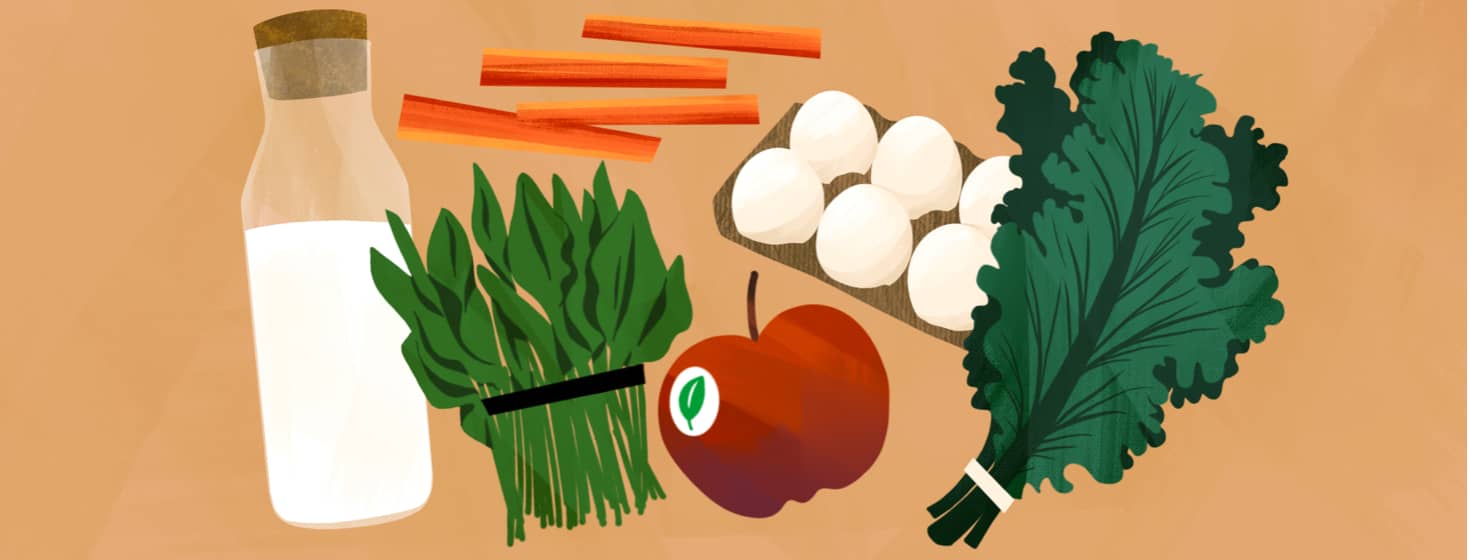Stocking Your Fridge for Healthy Eating
When you are living with IBS, it’s important to nourish your body with nutritious foods. By keeping a well-stocked fridge, you’ll make fewer trips to the grocery store, be more likely to choose nutritious foods, save money, and likely feel less stress when it comes to meal prepping. Today I’m sharing some of my favorite versatile fridge staples that can be used to create delicious and nutritious meals throughout the week.
Eggs
I’m a huge fan of eggs because they can be a great protein source for breakfast, lunch, or dinner. They’re considered a “complete protein” because they contain all 9 essential amino acids. They’re also packed with important nutrients like vitamins A, D, E, choline, lutein, iron, and folate. Don’t shy away from the yolk – while it’s true that egg yolks do contain cholesterol, research shows that eating eggs as part of a healthy diet does not increase the risk of heart disease.1 Try them scrambled, on top of salads, on toast, or in fried rice.
Milk or milk alternative
I always keep milk or a milk alternative like soy beverages in my fridge. Dairy milk is rich in protein, calcium, and vitamin D, making it a nutrient powerhouse that can be added to anything from smoothies to soups to baked goods. When choosing a plant-based beverage, be sure to check whether it’s fortified with calcium and vitamin D. If you’re choosing a lower protein plant beverage (like almond, coconut, or oat beverage), you can increase the protein by adding protein powder.
Yogurt
Yogurt is another calcium and protein-rich fridge staple. I love plain Greek yogurt because it can be added to soups, used to replace mayo or sour cream, incorporated into spreads and dips, or eaten with fruit as a filling snack. Yogurt also contains live and active bacterial cultures, which can support gut health and help maintain a balanced gut microbiota.
Dark leafy greens
Dark leafy greens are excellent sources of nutrition. They’re rich in B-vitamins, vitamin K, iron, antioxidants, and fiber.2 Try them in a salad, wrap, soup, stir fry, or omelet. To keep your greens fresh, remove them from the plastic container and layer the bottom of the container with paper towels. Gently pack the leaves back into the container, with a paper towel between layers. The paper towels will absorb moisture, helping to keep your greens fresh for longer.
Pre-cut vegetables
I always keep a supply of pre-cut vegetables on hand. Some of my favorites include carrots, celery, bell peppers, cucumber, cherry tomatoes, broccoli, and cauliflower. To save money, buy them whole, chop up them yourself, and store them in an airtight container. Having the vegetables pre-cut saves time and effort when you’re rushing to grab a snack or prepare a meal.
Long-lasting fruit
There’s nothing I hate more than wasting produce because it went bad before I had a chance to eat it. That’s why I love keeping long-lasting fruit on hand for nutritious snacks. Apples and citrus fruits can last up to 2 months in the fridge, so I like to stock up when they’re on sale. Be sure to store apples separately from other produce – they release ethylene gas, which can speed up the ripening of other produce.3
So, there you have it! With a little planning, stocking your fridge with some basic staples can help relieve the stress of meal prepping and ensure you’re filling up on important nutrients.
What is in your fridge? Let us know in the forum below!

Join the conversation